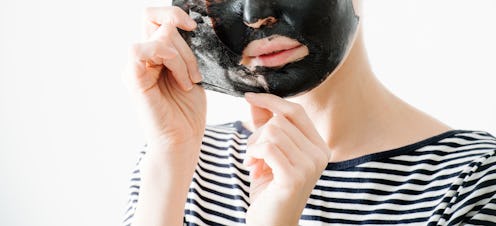(Beauty)
Why You Should Think Twice About Peel-Off Face Masks, According To Derms

Oh, hello there. You stumbled across this article by Googling “peel-off face masks,” am I right? I’m sorry to burst your beauty bubble, but you won’t find any product reviews or recommendations here. In fact, quite the opposite. I’ve stealthily and strategically interrupted your online research to deliver an important message: Please, please, don’t subject your skin to a peel-off face mask ever again.
Yes, I know: They look so fun on Instagram! Many an influencer has proclaimed the peel-off mask essential to any skincare routine! But according to dermatologists, the removal process strips away more than just dried-up mask goop — it also strips away the surface layer of your skin. Which is kind of an important layer.
“The peeling motion can be harmful because it can disrupt the skin barrier and lead to a lot of irritation,” Dr. Devika Icecreamwala, M.D., a board-certified dermatologist with Icecreamwala Dermatology, confirms in an email to The Zoe Report. This “barrier,” also called the stratum corneum, is your skin’s first line of defense against almost any issue — from acne to aging to dry skin to pollution damage and inflammatory conditions like eczema. It’s made up of your microbiome (billions of beneficial bacteria that protect against bad bacteria), your acid mantle (which blocks invading pathogens and viruses), and your lipid matrix (a mix of ceramides, fatty acids, and cholesterol that locks in moisture).
That sounds like a lot, but the barrier is incredibly thin. Like, 10 to 40 micrometers thin. That’s one millionth of a meter, or one thousandth of a millimeter. Thin enough to destroy with one fell swoop of a poorly-formulated skincare product. (And I say “poorly-formulated” because most peel-off products are made with polyvinyl alcohol, a plastic adhesive more commonly used to laminate safety glass. “Some people are sensitive to adhesive, which could cause further irritation,” Dr. Naissan Wesley, MD, F.A.C.M.S., a board-certified dermatologist who works with Arbonne, tells TZR.)
At first, the stripping of the barrier via peel-off mask might look great. It admittedly evens out the texture of your skin, removes dead skin cells, and reveals a fresh layer of living cells. This can read as smooth and glowy, and unless your skin is sensitive and prone to redness, the after-effects won’t become apparent until later. Days down the road, you may notice a new breakout, or patches of dryness, or an overall dull skin tone. Time for another masking session, you think. But nope — chances are, the peel-off mask caused those issues in the first place, says Dr. Icecreamwala.
Even if your particular skin is strong enough to withstand the pull of a peel-off without irritation, Dr. Wesley notes these masks aren’t necessarily doing your skin any favors. “In those cases, the peel off mask probably doesn’t do much,” she says, since the ingredients rarely penetrate pores (due to the water- and oil-resistant plastic in the formulation). “We have options for more proven and effective treatments available for improving skin texture or complexion. As opposed to peel-off masks, I prefer masks that have active ingredients that can address certain skin issues.”
Ahead, a handful of face masks dermatologists recommend you use instead. (Your stratum corneum says thanks, by the way.)
Try These Instead
This article was originally published on